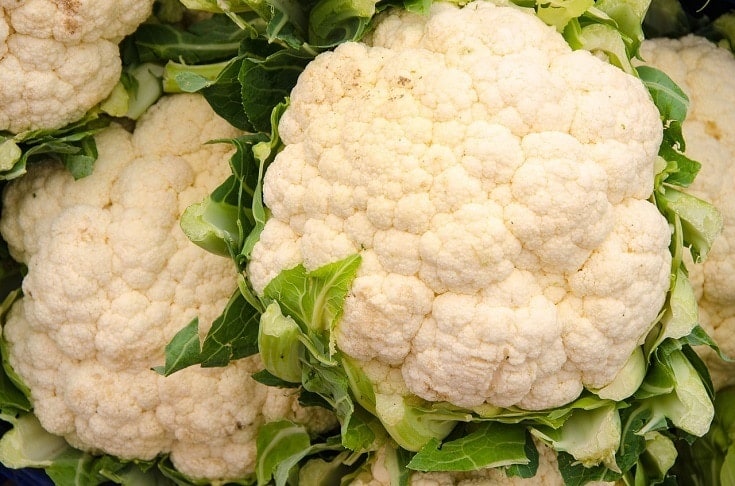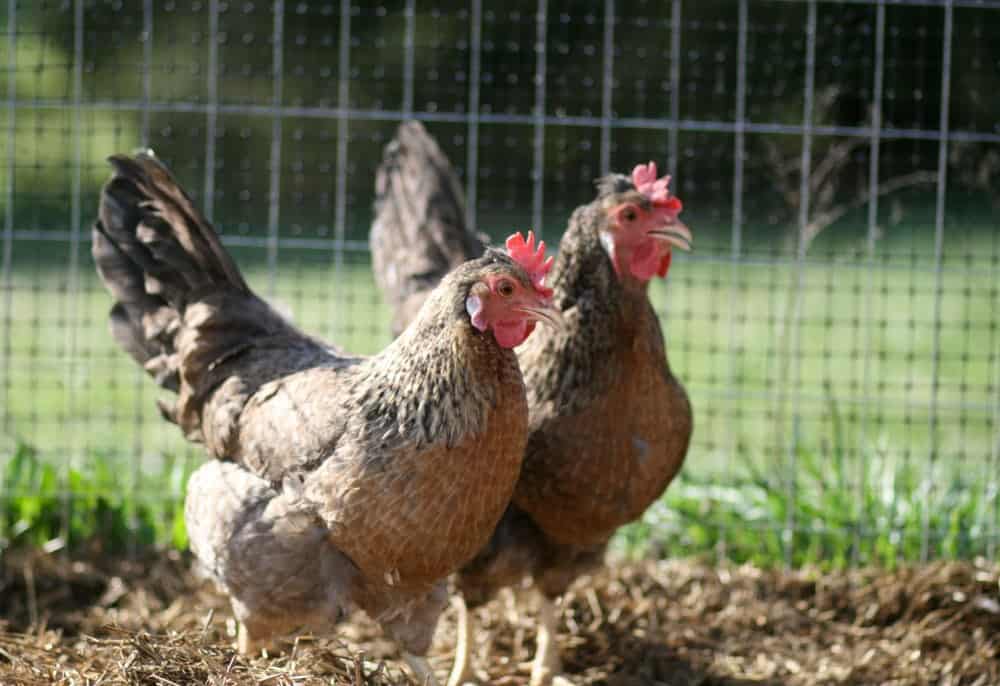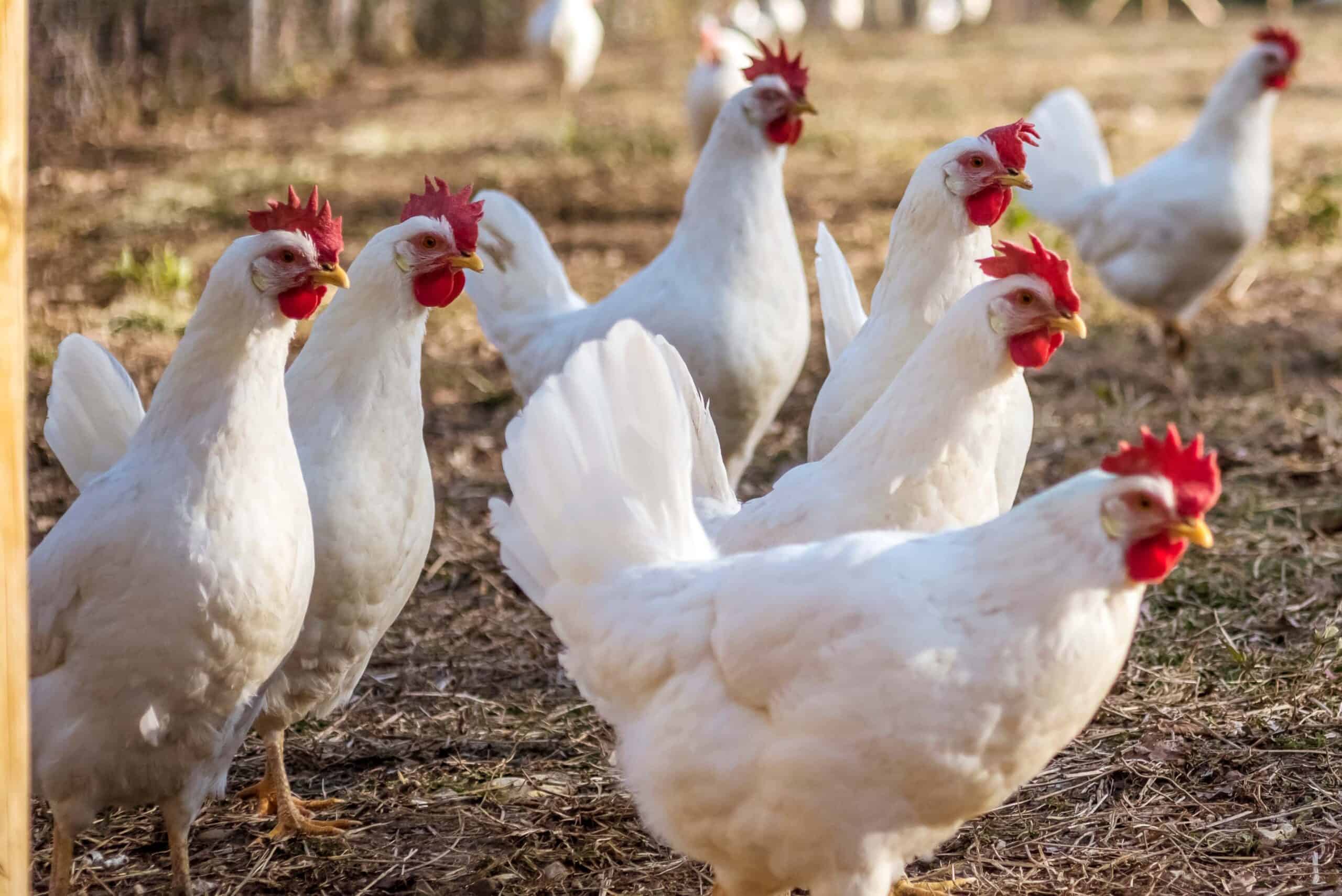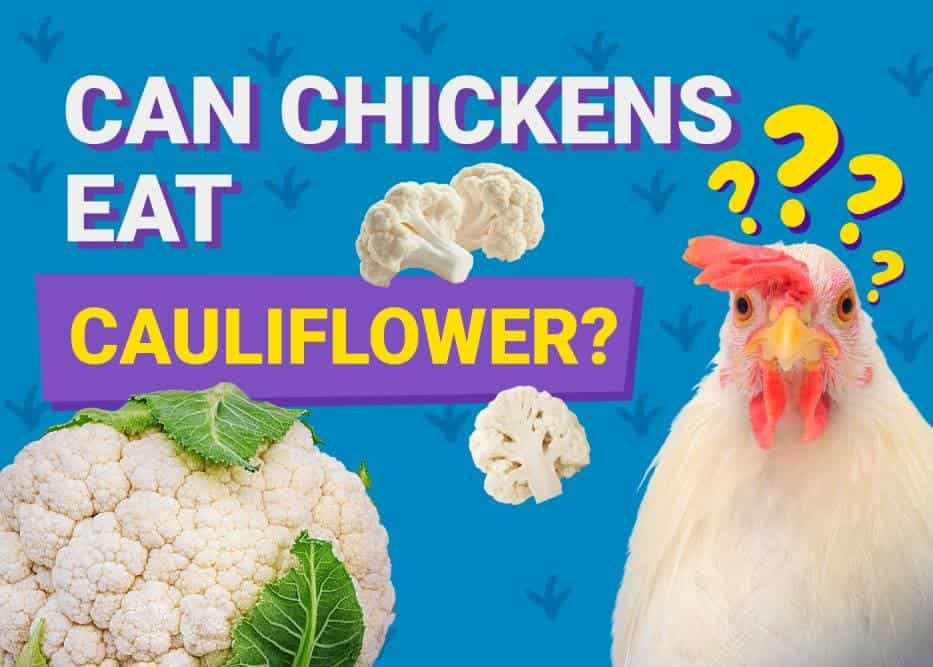Approved by Dr. Lorna Whittemore
It seems like chickens will eat almost anything! If you’ve ever wondered whether a chicken can eat cauliflower, the answer is yes. Cauliflower does not contain any toxins that would harm a chicken, so it is safe and healthy for them to eat. Many chickens even enjoy it!
This article will discuss the benefits of feeding your chicken cauliflower as well as some key things you should know before adding it to its diet.

The Benefits of Cauliflower for Chickens
A little cauliflower can go a long way for your chickens. This cruciferous vegetable is not only low in calories, but it’s also a good source of fiber. In addition, cauliflower is packed with nutrients essential for your chicken’s health.
Some of the benefits of feeding cauliflower to your chickens include:
- Improved digestion: The fiber in cauliflower helps to keep your chicken’s digestive system running smoothly.
- Calcium: Cauliflower is a good source of calcium, which is necessary for strong bones, laying eggs, and healthy feathers.
- Boosted immune system: The vitamins and minerals in cauliflower help to keep your chicken’s immune system functioning properly.

How to Feed Chickens Cauliflower
You can feed your chicken all parts of the cauliflower, the stems, florets, and leaves. This is useful because you can feed them the scraps from the parts you don’t use yourself in the kitchen. It is best to cut all the parts of the cauliflower into small pieces. This is especially important for baby chicks, who can choke on tough stems and big pieces of the vegetable. For chicks, take extra precautions when feeding raw veggies such as cauliflower.
If you choose to cook it, make sure you don’t leave it out for them to eat for an extended time, as it can go bad and attract mold and bacteria. One trick some chicken owners love is to hang a whole cauliflower head in the chicken pen. This way, the chickens can all peck at it in their own time, and it creates a wonderful treat as well as entertainment for your chickens.
(Be sure to check the law regarding the feeding of chickens in the country where you live. In some countries such as the UK feeding kitchen scraps to chickens is illegal unless you are a vegan household).
A Chicken’s Diet
It is surprising to many people that chickens can eat a wide variety of foods. Chickens are not particularly picky eaters and will often consume whatever is available to them. They are omnivores, so this includes both plant and animal matter. In the wild, chickens will forage for food and will eat a variety of insects, small frogs, and even small mammals if given the opportunity. While domesticated chickens are typically not given such a varied diet, they can still survive on a wide range of food items.
The best diet for a chicken is a diet that consists primarily of chicken feed as well as making available oyster shells, grit, and drinking water. This diet provides the chicken with all the necessary nutrients and minerals needed to stay healthy and thrive. The grit helps to keep the chicken’s digestive system functioning properly, while the clean water helps to keep the chicken hydrated and free from disease. The oyster shells provide much-needed calcium for these egg-laying creatures.
About 90% of their diet should be based on high-quality chicken feed formulated to provide maximum nutrition. However, chickens love fruit and vegetables. Vegetables such as cauliflower can make a nice treat for your chicken and add extra health benefits alongside their basic balanced diet.

Other Fruits and Vegetables Chickens Love
A chicken’s diet consists mostly of seeds, insects, and other small animals. However, they also enjoy eating a variety of fruits and vegetables. Some of the most popular vegetables that chickens enjoy are lettuce, beets, broccoli, carrots, kale, swiss chard, squash, pumpkins, and cucumbers.
- Dark Leafy Greens: These are a good source of vitamins A, B6, C, and K. They are also a good source of manganese, calcium, and potassium. All of these play a role in egg production, as well as supporting the chicken’s overall health.
- Broccoli: Broccoli provides folate, vitamins C and K1, as well as iron and potassium. Vitamin C can benefit stressed chickens and reduce inflammation. K1 helps prevent blood spots in eggs and coccidiosis, which is a digestive disease in chickens.
- Cucumbers: These are great for hydration and are a good thing to feed when the chickens are overheated on a hot and dry day.
- Carrot Tops and Peelings: Amongst all the nutrients carrots provide are vitamin A, vitamin B6, biotin, potassium, and vitamin K1. They also provide antioxidants, which help with meat color, immunity, and fertility. Biotin can help with skin issues around the chicken’s feet, beak, and eyes.
When it comes to what fruits chickens eat, watermelon is a popular choice. Chickens also enjoy strawberries and blueberries. Watermelon is a good source of hydration for chickens and can help them stay cool in the summer heat. Strawberries and blueberries are both packed with nutrients that chickens need to stay healthy.
Chickens are attracted to the color and smell of certain fruits and vegetables. They also like to peck at them and play with them before eating them. This helps the chicken to stay healthy and active.
Depending on your chicken’s health needs, the daily climatic conditions, illnesses, or stress levels, you can use fruits and vegetables to add to their diet as you observe their needs that day. This allows you to balance out all the factors that can impact chicken health and create a healthy coop.
Chickens and Kitchen Scraps
The next time you’re about to toss out those vegetable scraps, think again! Your chickens will love to eat all the parts of the vegetables that you don’t use, from the radish tops to the peelings to the unused bits you don’t want. Feeding chickens kitchen scraps is a great way to create a biodynamic loop between you and your chickens. You reduce waste and, at the same time, supplement your chicken’s diet with all sorts of helpful nutrients. (Again remember to check it is legal to do this in your country.)
Additionally, using small scraps is a better way to get these foods into your chickens’ diet as it is easier for them to eat smaller bites. So next time you’re chopping up veggies for dinner, save the scraps for your feathered friends.

Foods to Avoid Feeding Your Chickens
Chickens are known to eat most things, but some things are bad for them.
- Chocolate: Just like dogs, the compound in chocolate can be toxic for chickens. Do not feed them chocolate, even in small amounts.
- Raw Beans: Surprisingly, even though chickens like seeds, they cannot eat raw beans. The raw beans contain a toxin called phytohaemagglutinin, which is deadly for chickens.
- Tea and Coffee: Coffee grounds or old tea bags are not a good option for your chickens. Not all compostable foods can be fed to chickens.
- Green Potatoes/Tomatoes: Solanine/Tomatine is a toxin that is made by veggies in the nightshade family. This toxin is harmful to chickens in green potatoes/tomatoes.
- Avocado Pits/Skin: These contain a toxin called persin that can be lethal for chickens.
- Rhubarb: Rhubarb can have an unwanted laxative effect due to the anthraquinones it contains. If it has been frozen, it also has oxalic acid, which is also fatal for chickens if they ingest it.
- Greasy/Salty/Sugary Foods: These foods are not toxic, but they can result in wet feces and can be harmful.
Don’t Overfeed on Treats
The rule of thumb for feeding chickens is the 90/10 rule. This means 90% of their food should be chicken feed, and 10% can come from treats and extras. For a normal chicken, this means only a few tablespoons a day. Overfeeding on treats can have adverse effects impacting their plumage, health, and egg laying.

Conclusion
In conclusion, yes, chickens can eat cauliflower, and it is a great food to try and see if your chickens love it. This vegetable is a good source of vitamins and minerals, and it can help improve the health of your chicken’s digestive system. Just be sure not to overfeed it and to make sure it is digestible for your chickens and chicks.
